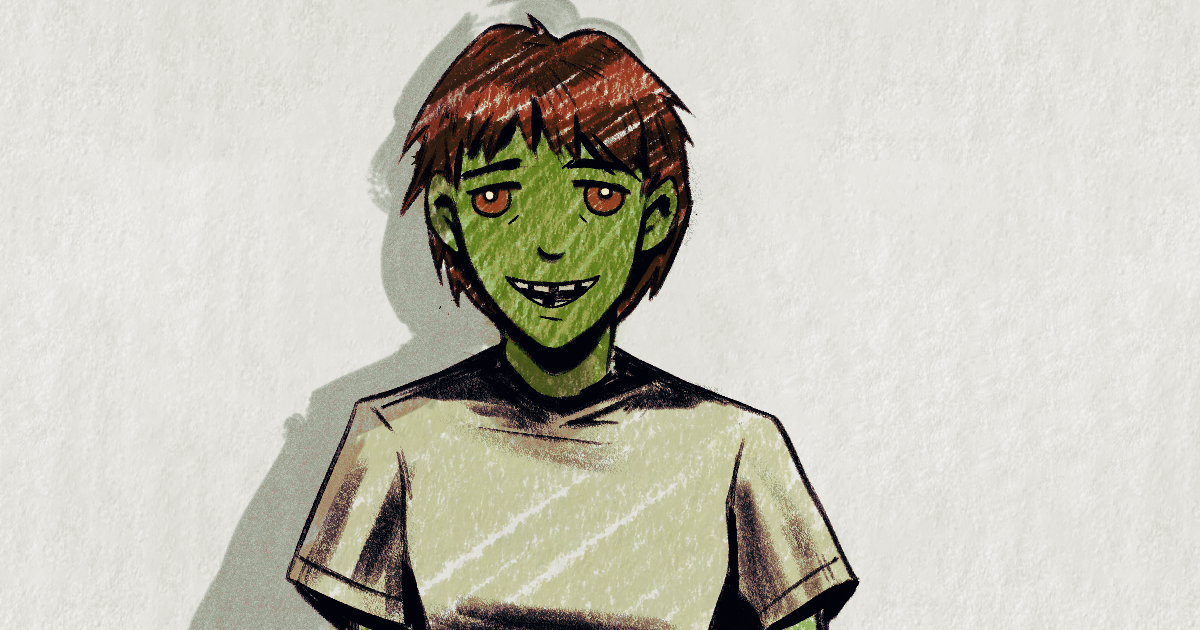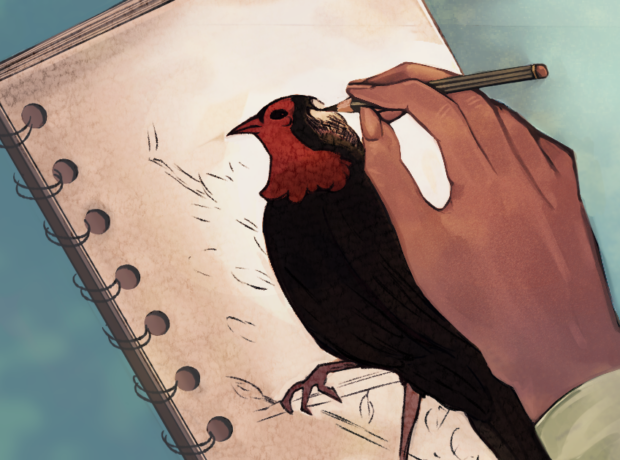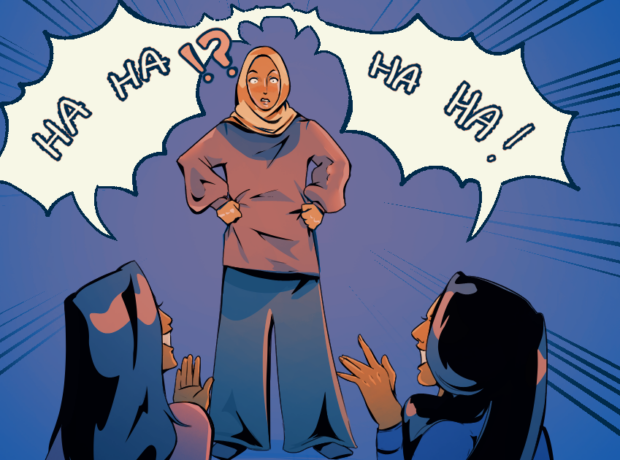Using the metaphor of Frankenstein, this story unpicks the experience of being a first-generation immigrant, caught between Sri Lankan heritage and identity as a teenager in modern Britain.
Ollie Hadgie is the joint-winner of the University of Warwick’s eighth annual Writing Wrongs Schools’ Competition, organised by the Centre for Human Rights in Practice. This is their winning article which they reworked with Lacuna Magazine during a paid summer internship.
The self-portrait hangs on the fridge, its crowning pedestal of shame, embellished with the disappointed glances she sends its way whenever it catches her sight. Wide dark eyes, framed by highlighter-green skin.
It had been a joke, to tell the truth. A bit of a laugh.
It was the sort that seemed funny among cackling friends and funnier still in the face of an exasperated teacher. It was less so when it sat between my mum’s hands, my own time-traveller’s marvel. It glares over her shoulder as she waves the phone in my face.
“Talk to her,” she hisses in syllables she doesn’t belong to.
I pull out an earphone, like a mediaeval knight lowers his shield, or the hanged man drops from the gallows. The music, tinny and shrill, still buzzes in my hand as I exchange it for her peeling phone case. My aunt’s face hovers blearily up at me, the way I’ve always known it, a flickering, unchanging mass of pixels. I can’t tell if the new lines on her face are from age or a cracked screen protector. 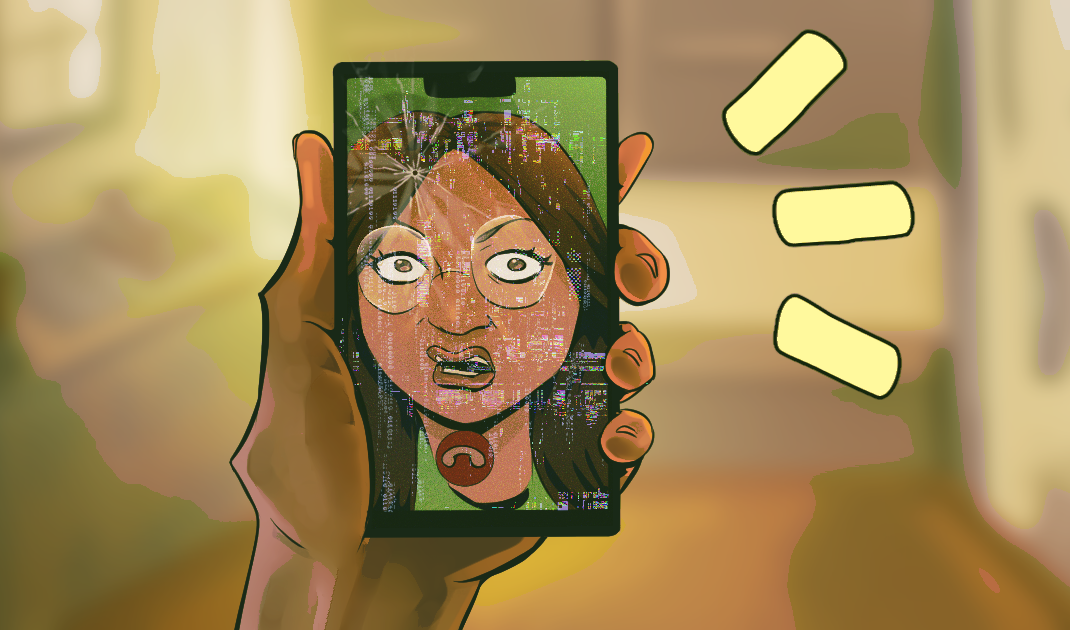
There’s a certain embarrassment in talking to relatives. Spitting out the same stock phrases we always do – wind up dolls twisted too tight, a puppet with its fabric tongue lolling out. My voice doesn’t sound like myself. Neither will hers. There’s something too practised about it, the way we speak wasted wooden words, lost in translation and time zones, while my mum stands in front of me like I’ll bolt if she drops her security-guard gaze.
Beep-beep. Lost Connection.
That’s what I used to do when I was younger. Run, cheeks burning and legs pulling me far and fast, away from these staticky strangers, refusing to be stuck together like stray puzzle pieces. Polarised magnets: pushed together across timelines by the vicious determination of love; pinging apart across continents.
Did you know you can change the polarity of a magnet? Demagnetise and repolarise. Turn north and south on its head until the compass is spinning well and truly into an identity crisis.
Isn’t that funny? To change the unchangeable, it must first be moulded out of recognition. With enough force, you can even bend the rules of nature. Our first lesson.
She’s still talking – my aunt – as I chew on cheek-flesh, keeping eye contact with the portrait, held by the magnets we bought last time we visited Sri Lanka. The left corner is pinned by a wooden elephant with spring coil limbs. One of them is bent terribly out of shape. The brown trunk droops down the gap of white paper that pierces through green ink.
Brown. Green. White.
I used to think it was strange that we had no family here, that they were all back home. I couldn’t understand why they hadn’t left too. Then I realised we were the strange ones, breaking off to venture into the countries that ruined us so we wouldn’t ruin ourselves. I guess we learned it from the homeland. We watched it break away from the continent, restructure and reshape until unrecognisable, until the world forgot it.
The pearl of the Indian Ocean, fallen off the ear of a giant.
There’s a lull in conversation so I seize my chance. I fit a rough goodbye into the hollow of her words, shove the phone into my mum’s hands before she can argue.
I can feel her eyes follow me as I flee the scene, hands dripping with common blood. There’s a quiet disappointment crackling in the air as she turns back to listen to my aunt, like a lightning storm that will never arrive. The anticipation is enough.
I pass the bookcase on my way upstairs, packed with Western literary brilliance. My finger catches on a book of myths, feminist retellings that snatch back agency and leave scratch marks. The blue fabric is adorned with doodles of classical figures. Echo crouches in the corner, cursed to repeat everyone else’s words, scrape herself away until her shavings formed a looking glass. I imagine myself slotting between those white stencils. Struck dumb by dialect, muddied heart bleeding between porcelain teeth, no room for declaration to those who should matter the most.
***
The next day, the phone-call is still poking at me, like a hangnail that won’t scab. Picking and prodding, pulling and pinching all throughout school at the shape of my digital aunt’s words leaving her digital mouth. As the tube doors close and turn black, my reflection looms. Wide dark eyes blink and goggle; two from the dozens that pack the homeward rush-hour.
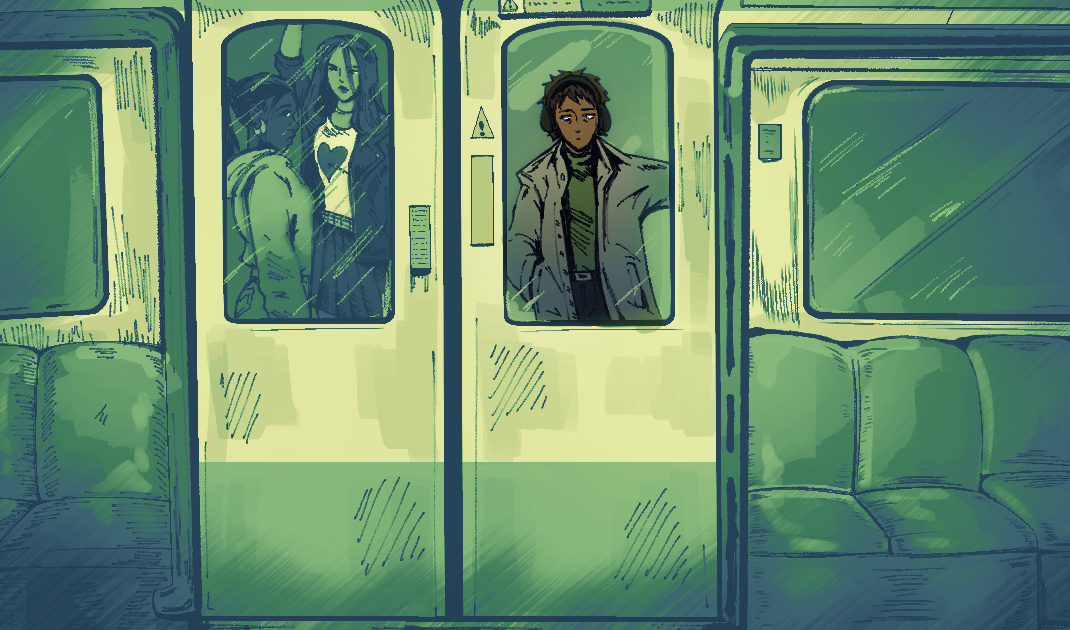
My mum always said I’m built like a dancer, tissue paper and bird bones. Spindly and small, as though pressing enough pressure to the dip of my wrist could make me collapse into a pile of splinters. A china doll insistent on grabbing every bull by its horns.
The tube carriages rock and darkness zooms. This liminality is tasteless. In the stories, no hero ever stops in purgatory. It’s always a waystation, a passageway from snarling depths to greener pastures. It’s a poor excuse for what life feels like these days: elevator music, acrid with artificial anticipation like time’s burning holes in my tongue with the promise of tomorrow.
In the stories, no hero feels like me either.
I shouldn’t mope at them, wilt at the white children’s luxury of choice. These movie stars, brown and bright and with all my bite and yet none of me. At least I’m seeing them, calling my friend up in excitement and looking up all their other projects. At least they’re being seen.
To ask for more is to be ungrateful.
It’s the first lesson you’re taught as a first-generation immigrant kid. Be grateful. Sacrifice becomes the sugar and salt that plaques your teeth, becomes the stuffing in the pillows that pry shut your dreams. Blessing is built into every betterment.
I’m too selfish for grace. Too brash not to let bridges burn, to bite my tongue and bow at every ancestor who broke their backs so I can break their hearts.
Take what you’re given. Turn everything that doesn’t glitter into gold, then ensure your children do the same.
The doors clink open again and I’m walking, always too fast, boots swinging and coat swishing down my thighs. All my clothes hang too big except a chest tapered tight. My heel stamps a puddle and for a moment, the clouds shiver and the whole frame turns milky-white, slowly melting back to mud.
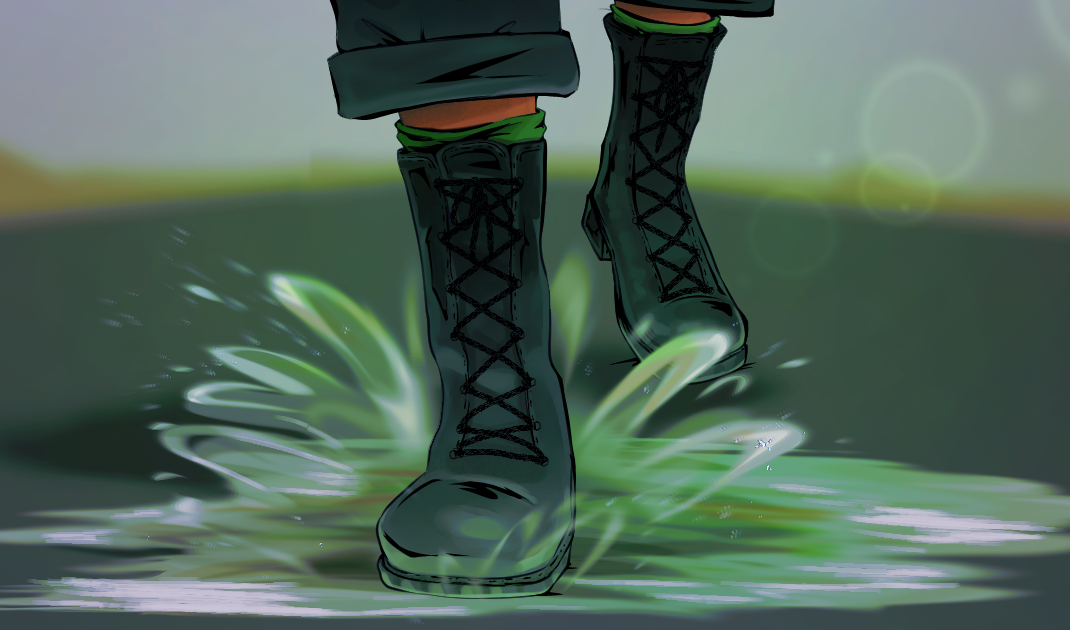
Brown and white. Like a coconut slammed against a rock, split in two, spilling out starlight from a roughened husk.
“You’re a coconut.”
She had said it like I was stupid. Her voice, jewel-tone bright even through memory’s blur, cut through the cacophony of the playground, narrowed my small, small world down to a knifepoint. An X-ray couldn’t have seen me as clearly as she did in that moment, cruel and cutting in the way only seven-year-olds could be, leaving me shivering in the midsummer warmth.
“Brown on the outside. White on the inside.”
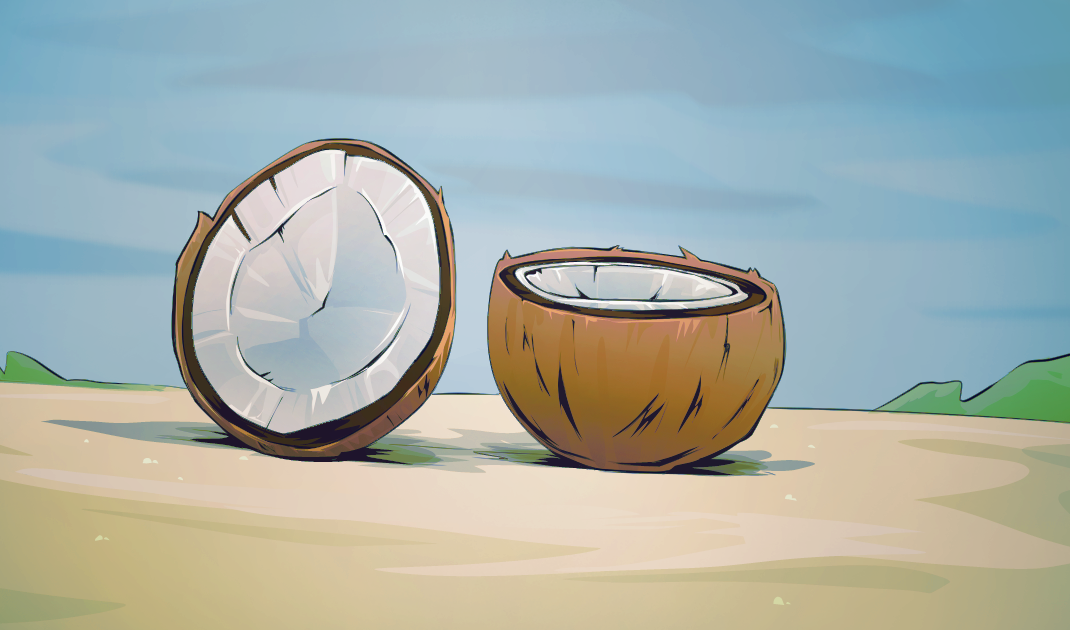
***
I have the playlist up from yesterday. It’s all angsty old Brit bands from when my parents were children. Twanging guitars and funky basslines that, if you trace it, would always come back to black visionaries. Nobody remembers that part.
There’s a missed text blinking on my phone, from a friend – my parents’ favourite. A proper Sri Lankan, she is. Speaks her language; knows her songs and her movies, the real Sri Lankan ones instead of that Western nonsense; collects friends who wear their heritage like a hi-vis. Bright as the equatorial sun, they crow “white-washed” at each other. I paint my walls with the word and the paint drips slowly, sticky like rose syrup, down my skin.
“What’s wrong with being white? Or British?” a different friend asked me once, nose wrinkled, arms folded, sunlight reflecting her skin, summer-tanned, as we watched them all turn culture into a pissing contest.
“Nothing,” I said, placating and plastic, stuck on the wrong side of a circus act, trying to balance bruised feelings in one palm and a butchered tongue in the other. I can’t explain how scabs become swords, how off-key Bollywood songs haunt like a funeral march or how biting-the-hand-that-feeds becomes remarkably easy when it wipes you off like a stain.
We changed the subject to the election: a landslide victory, they said. The biggest change to English politics since 1979. Five seats out of 650 aren’t a lot, if you think about it. Those men in the street marching in black shirts meant nothing too. Pay them no mind, dear, they’re not causing any harm. Those smashed windows are just a fluke, a tragic accident, a blip on the record. We’re taking our country back, if you know what I mean. Punching up. Punching down. It’s all a matter of perspective, to be honest.
Jamming my key into the lock that always sticks and slipping through the corridor, the portrait catches me from the corner of my eye. It really had been a joke. Everyone in school had to make one; a display to showcase our community’s diversity.
My school’s so diverse I’m choking on it. Hundreds of children; all colours and creeds. Yet, behind the rose-tinted glasses, there are still snickers over accents, still names more mangled than roadside carrion, still a precedent: victim, varlet.
I scribbled the skin green and vivid with a fierce, furious pride. Wide dark eyes and a gawking mouth with bolts bordering the angular slope of a chin. My aunties’ curves and my father’s teeth. The lesions of legacy and the softness of skin unhealed. My teacher barely glanced at it before she sighed and went to the next child, underpaid and unmoved.
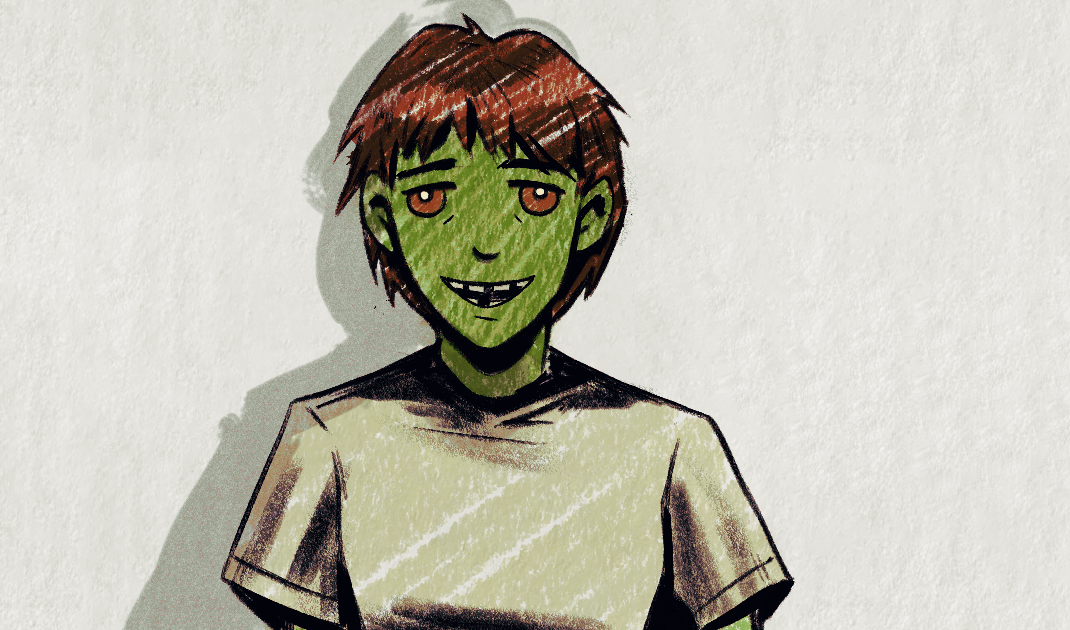
The green is the same shade as my new earrings, gold embossed, waiting on my desk for me to try them on.
“I look so brown.”
Instinctual, incredulous, incensed, the words fly out and hang in the air, mocking around a mouthful of crushed glass, the truth of it. Standing before my mirror with my hair braided in two, glasses fixed on my nose, sun-spiralled earrings hanging, the truth of it.
Haloed by the posters on my wall: British words from a foreign mouth, All-American pop stars and Brazilian best friends; a half-Bengali ex-boyfriend who clung to his whiteness like a life-preserver and Indochinese-Tex-Mex takeaway turned Ship of Theseus, begging the question of when adaptation becomes suffocation, cremation?
In the windstorm of culture and caricature, a Sri Lankan, glasses fixed and earrings hanging, pushes their way into the frame, past all the mismatched puzzle pieces they can’t remember when they found, and all the paper clippings collaged on their cheeks, choking on the truth of it.
Brown. Green. White.
Like Frankenstein’s monster.
Like a coconut.
All artwork by Isabelle Broad.
Read more:
